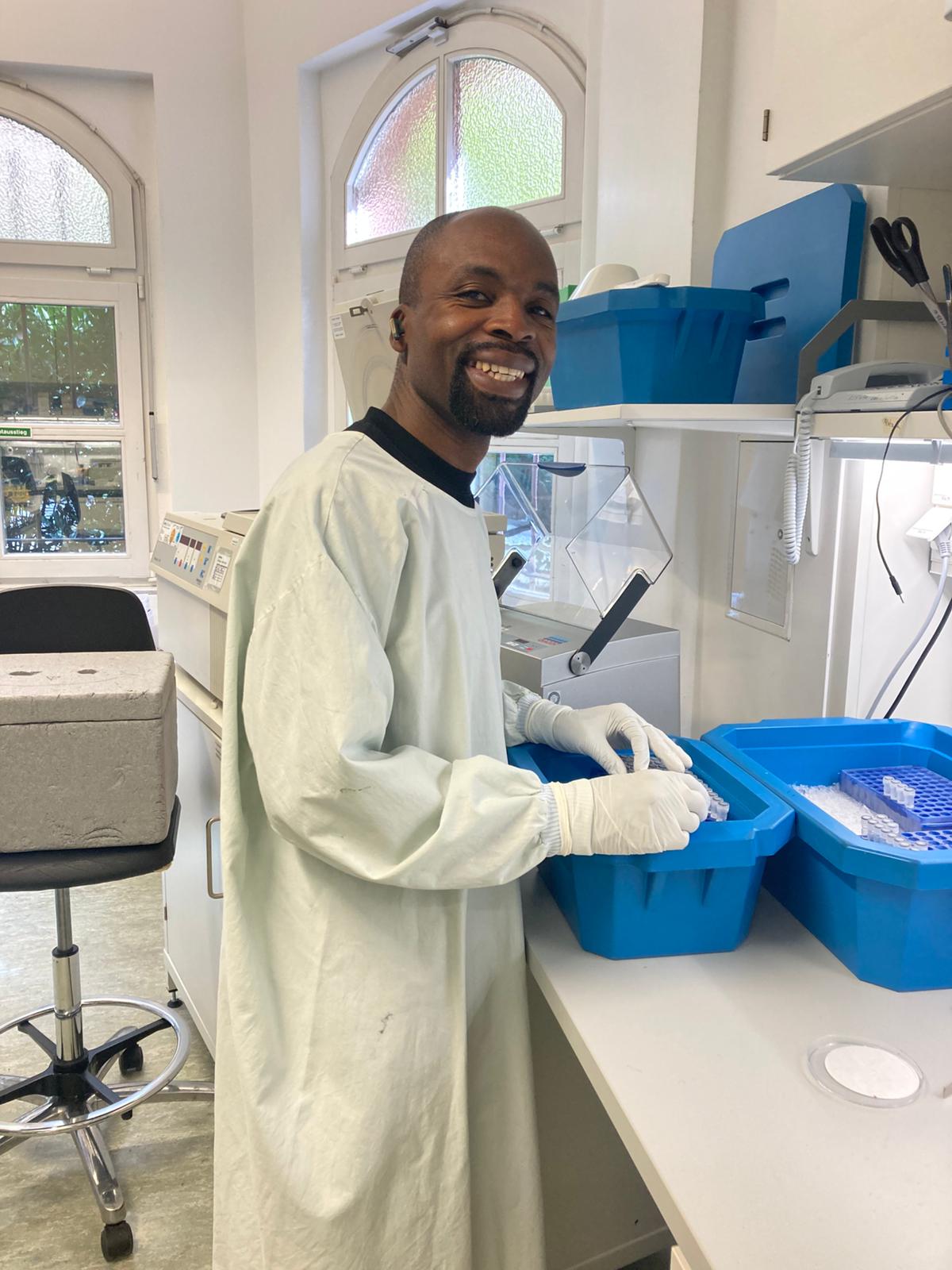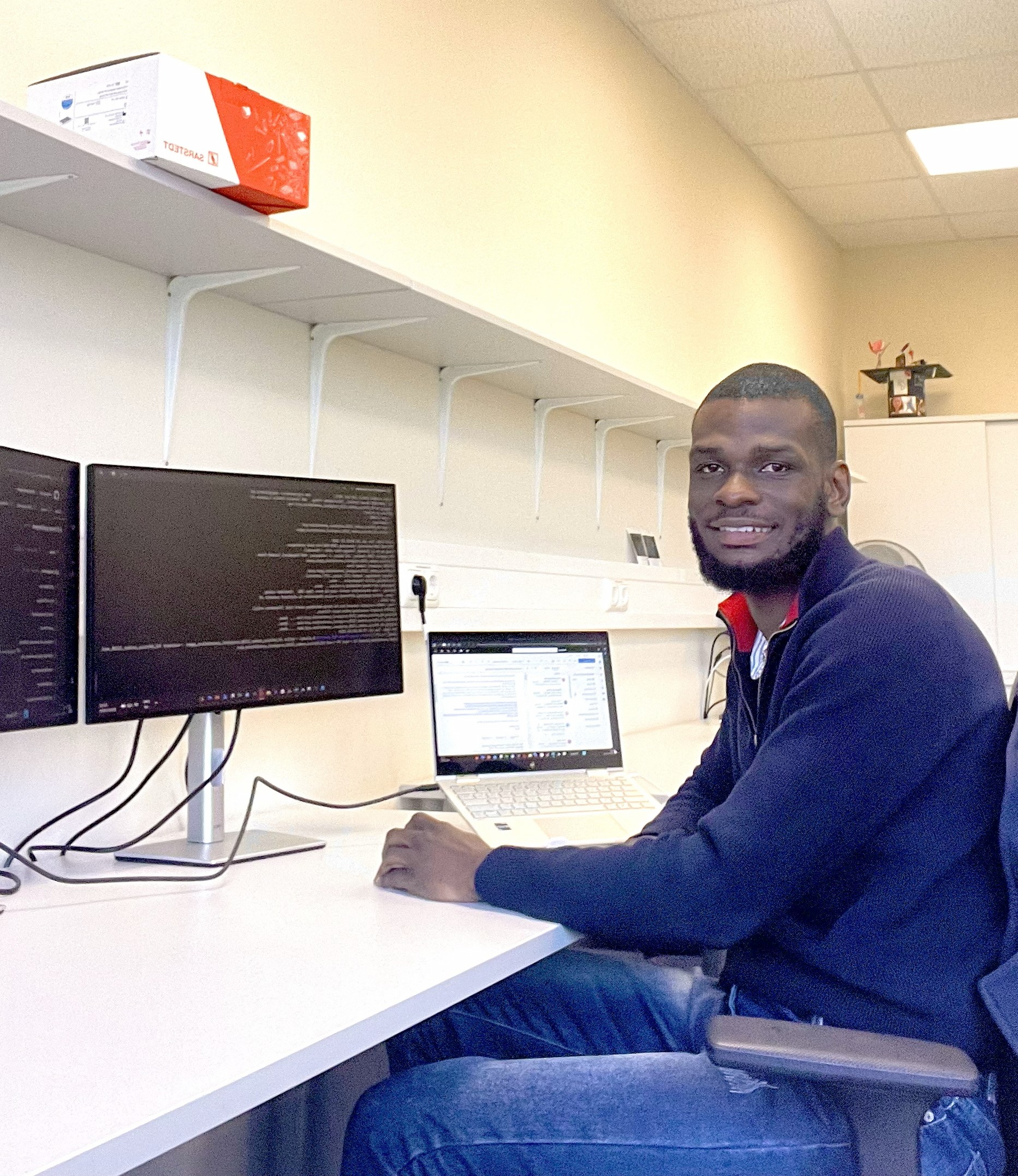Brief introduction to research grant recipients

My name is Erick Evans Kigai Bigala, a Ugandan by nationality, PhD student and One Health researcher currently based at Institute of Virology in Berlin. I did my PhD data collection in the Albertine Rift (AR), a known biodiversity hotspot both in Uganda and Africa at large. As a dedicated One Health researcher, I am involved in studying and contributing to efforts meant to address the growing threat of zoonotic diseases in one of Africa’s most biodiverse and ecologically fragile regions. I am intrigued by the intersection of wildlife, livestock, and human communities in this region because it creates a fertile ground for the emergence and spread of arboviruses, yet research and surveillance remain limited. My impetus is the urgent need to understand how environmental changes impact infectious disease dynamics. My choice of the Institute of Virology in Berlin is premised on the fact that it is a leading centre of excellence with advanced capabilities in arbovirology and molecular diagnostics, where multidisciplinary research is embedded in a strong One Health framework. Its infrastructure and expertise uniquely support the rigorous analysis of my tick and blood samples, enabling robust characterisation of arboviruses circulating in wildlife, livestock, and human populations. My motivation for this work is both scientific and personal: Thus, there is an urgent need to understand how biodiversity loss and land use changes in ecologically sensitive areas like the Albertine Rift influence the emergence and transmission of zoonotic arboviruses. Understanding the ecological drivers behind these threats is essential to designing sustainable, locally informed interventions. There is also a pressing need to protect both vulnerable ecosystems and the health of the communities that depend on them because communities living in close contact with wildlife and livestock in the Albertine ecosystem are increasingly vulnerable to emerging infectious diseases. Following this training, I will return to Uganda and be part of the synergy that will contribute to local capacity building in zoonotic disease surveillance and One Health implementation to scale up arbovirus surveillance efforts. I will also share knowledge through local academic and public health networks, and contribute to national and regional One Health strategies. Supporting my work is not only a contribution to academic advancement, but also a direct investment in practical, scalable solutions to global health challenges emerging from the frontlines of biodiversity loss and land-use change.
partner institute: Charité Berlin - Institute for Virology
period: July 2025 - October 2025

My name is Theophilus Afum, a PhD student at the University of Ghana, affiliated with the West African Centre for Cell Biology of Infectious Pathogens (WACCBIP). I am currently undertaking part of my PhD research at the University of Hamburg, Germany.
According to the World Health Organization, tuberculosis (TB) remains the leading cause of death by a single infectious agent, affecting both humans and animals. Over the past six years, I have worked extensively on the Mycobacterium tuberculosis complex (MTBC), focusing on pathogen behavior, drug resistance, and modes of transmission. For my doctoral studies, I am specifically investigating hostpathogen interactions that may explain the geographical restriction of Mycobacterium africanum (Maf), a member of the MTBC, to West Africa.
There is a prevailing hypothesis that M. africanum may have an animal reservoir in West Africa, suggesting possible zoonotic transmission and coevolution between the pathogen and certain human populations, possibly defined by ethnicity. To explore this, I collected sputum and blood samples from consenting TB-positive individuals and healthy household contacts. From the sputum samples, I isolated MTBC strains, extracted bacterial DNA, and performed whole-genome sequencing. Data analysis is currently ongoing.
The second component of my research involves identifying potential human genetic factors associated with susceptibility to M. africanum. For this, DNA was extracted from blood samples of both cases and controls and shipped to Germany for SNP genotyping using the H3Africa SNP array. This research bridges human genetics, pathogen genomics, and infectious disease epidemiology, aligning with the One Health framework. The project aims to address two key objectives:
1. To characterize human genomic variation using the H3Africa SNP array.
2. To identify genomic loci that mediate interactions between the human host and MTBC.
Achieving these objectives requires advanced resources and expertise in human genetics and bioinformatics. Professor Dr. Tobias Lenz at the University of Hamburg provides the ideal environment for this work, with the necessary software, established analytical pipelines, and expert supervision.
Understanding host-pathogen interactions is critical for developing improved diagnostics and control tools—such as rapid tests and vaccines—and for advancing host-directed therapies. As the global community shifts toward precision medicine and evidence-based policy, studies like mine are essential.
This research stay at the University of Hamburg is enhancing my skills in bioinformatics and human genome analysis. The knowledge I acquire here will be transferred back to Ghana, where I intend to train fellow researchers and colleagues in the One Health approach, which considers the interplay between the pathogen, the host, and the environment. Strengthening this framework is vital to achieving the global goal to End TB.
partner institute: University of Hamburg, Institute for Animal Cell and Systems Biology, Research Group for Evolutionary Immunogenomics
period: July 2025 - October 2025

My name is Vinícius Klain, I am a postdoctoral researcher affiliated with the Biotechnology Center at the Federal University of Rio Grande do Sul (UFRGS), Brazil. My research is part of a large, nationwide collaborative project called ResGen (ufrgs.br/resgen). The project aims to address the growing challenge of antimicrobial resistance (AMR) through genomic and metagenomic surveillance.
AMR is a global health concern caused by the overuse of antimicrobials, the lack of effective public policies, and environmental contamination. Although antimicrobial resistance genes (ARGs) naturally occur in microbial populations, human activities have dramatically accelerated their selection and dissemination. Within the ResGen framework, our project combines genomic sequencing of resistant fungi and bacteria with metagenomic analyses of diverse sources, including environmental samples, clinical human isolates, livestock, food products, and wild animals.
My research focuses on wild primates, particularly brown howler monkeys (Alouatta guariba). These primates inhabit fragmented landscapes and frequently live near human settlements, agricultural fields, and domestic animals. Using high-throughput sequencing, advanced spatial analysis, and statistical modeling, my research explores the influence of urbanization, habitat loss, and fragmentation on the resistome of howler monkey populations.
During my stay at the Helmholtz Institute for One Health, I will use a hybridization capture approach to enrich metagenomic libraries and enhance the detection of ARGs. I will also analyze samples from a river that receives untreated hospital and domestic wastewater to investigate how inadequate sanitation drives the spread of ARGs into wildlife and ecosystems. My research will examine whether hospital effluents, urbanization, and habitat disturbance influence the diversity and origins of resistance genes in wild primates and if these ARGs are phylogenetically linked to those in contaminated rivers, which could reveal potential transmission routes.
The expertise I will gain here will be transferred back to Brazil, where I intend to share these methods with students and collaborators to expand local research capacity on antimicrobial resistance. By integrating molecular tools, spatial ecology, and the One Health framework, my work aims to contribute to regional and global efforts to mitigate the spread of resistance genes across human, animal, and environmental interfaces.
partner institute: HELMHOLTZ Institute for One Health, Greifswald
period: September 2025 - December 2025

